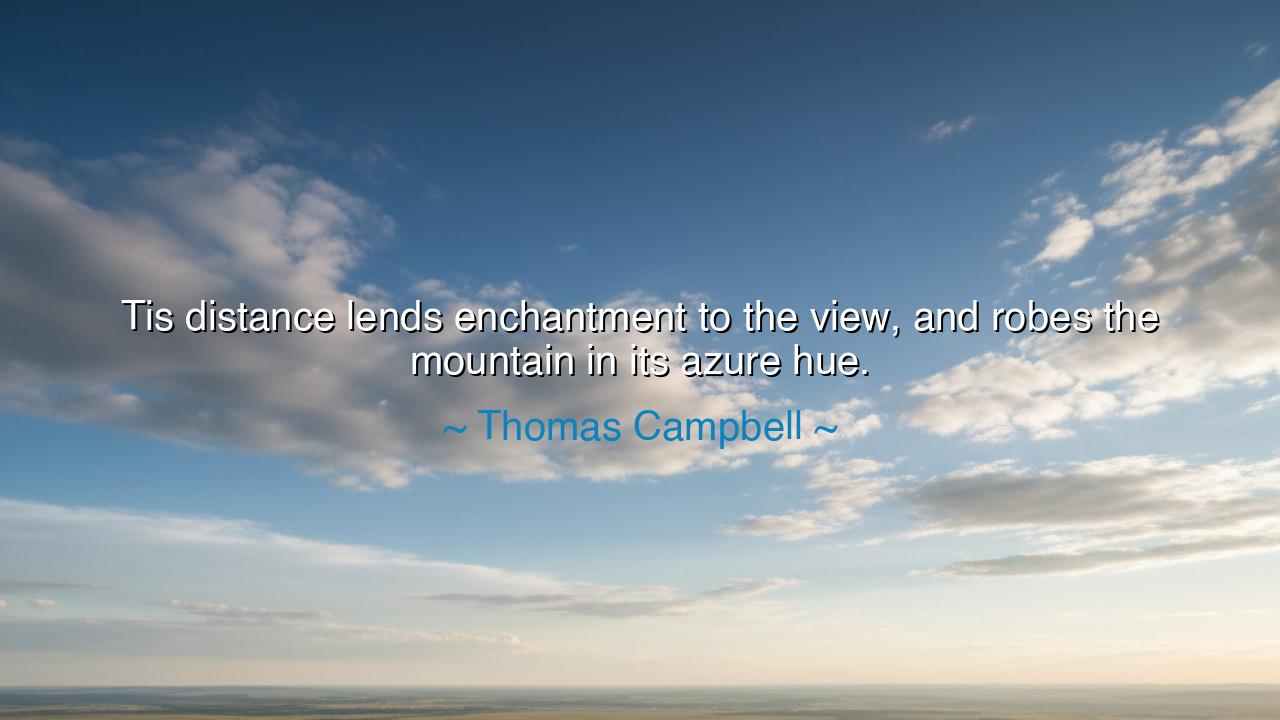
Tis distance lends enchantment to the view, and robes the






Hear now the words of Thomas Campbell, poet of the Romantic age, who wrote with the voice of yearning and reflection: “’Tis distance lends enchantment to the view, and robes the mountain in its azure hue.” In these lines, he speaks not merely of landscapes, but of the soul’s vision of life. For when we stand far away, the mountain glows with beauty, softened by the air, bathed in mystery, clothed in blue. Yet when we approach and touch its stones, we see the roughness, the cracks, the sweat of the climb. Thus Campbell reveals the paradox of perception—that what is far may appear enchanted, while what is near may seem ordinary, though it too holds truth.
The origin of these words lies in the Romantic vision of the world, when poets sought meaning not only in reason but in feeling. To Campbell, distance was both literal and spiritual. He saw how memory and longing beautify what is no longer present. A childhood home, once plain, glows with sweetness when recalled from afar. A lost love seems more perfect in memory than in daily quarrel. Even lands we have never seen—distant shores and ancient empires—stir the imagination with splendor. Enchantment is the gift of distance, clothing reality in colors our eyes do not see up close.
Consider the tale of Odysseus, who longed for Ithaca. To the weary wanderer, his homeland seemed more beautiful with each passing year, though it was but a rocky isle with humble fields. Yet distance gave it glory, filling his heart with longing stronger than the allure of Calypso’s paradise. And when he at last returned, though Ithaca was simple, its very reality was richer because his heart had robed it in the azure hue of memory. The mountain of his homeland was plain, yet in his spirit it was majestic.
So too in history, recall the words of soldiers who, in distant trenches, remembered their homes. The mud around them was bitter, but the thought of quiet hills, of mothers and wives, of fields and rivers—these seemed to them like heaven. And yet, when they returned, they often found those same homes were smaller, less radiant than memory had painted them. The enchantment lay not in the place itself, but in the distance through which the spirit viewed it.
This teaching reveals both beauty and caution. Beauty, in that distance allows us to dream, to see beyond the flaws, to clothe the world with wonder. But caution, in that the enchantment of distance may deceive, making us despise what is near, always yearning for what is far. How often do men abandon what they have, chasing after what appears brighter on the horizon, only to find it no more glorious than what they left behind? The mountain robed in azure may, up close, be a barren rock.
O children of tomorrow, learn from this wisdom: cherish what is near as much as what is far. Do not let distance blind you to the beauty in your midst. The home, the friend, the love, the life that seems plain up close may, if lost, become the very mountain you long for in memory. See it now with the eyes that distance would one day lend. Enchant what you have, not only what you lack.
Therefore, live with balance. Let distance inspire your dreams, but let nearness guide your gratitude. When you gaze upon the mountains far away, let them awaken wonder—but when you walk upon your own fields, let them awaken thanksgiving. For the truth is this: all things are clothed in azure if the spirit knows how to see.
Thus Campbell’s words endure: “’Tis distance lends enchantment to the view, and robes the mountain in its azure hue.” May you remember that what is far may glow with magic, but what is near may hold the truest treasures—if only your eyes are open.






AAdministratorAdministrator
Welcome, honored guests. Please leave a comment, we will respond soon